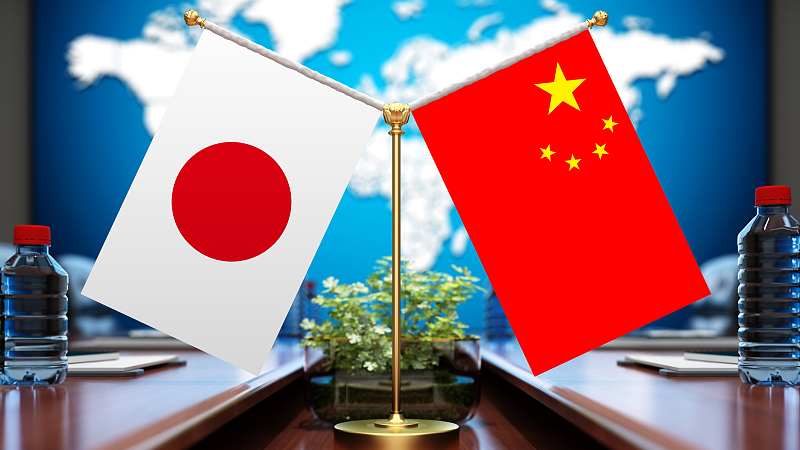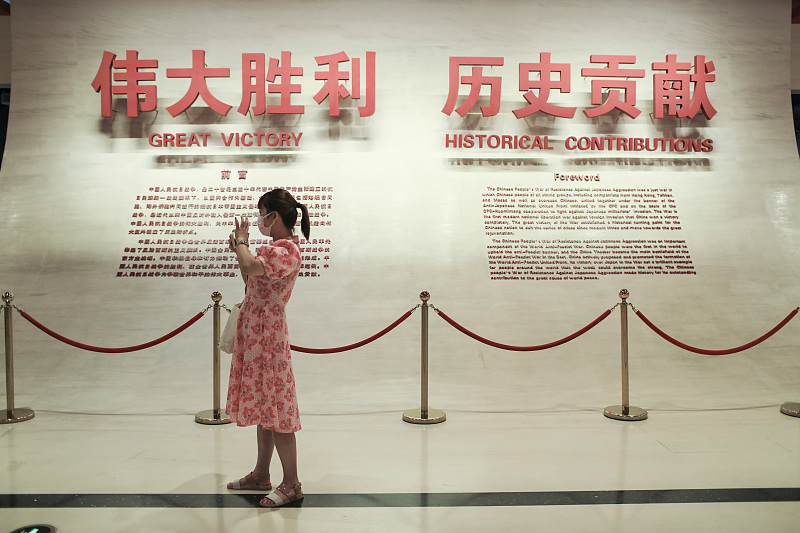
National flags of Japan and China. /CFP
National flags of Japan and China. /CFP
Editor's note: Hamzah Rifaat Hussain, a former visiting fellow at the Stimson Center in Washington and former assistant researcher at the Islamabad Policy Research Institute, is a TV anchor at Indus News in Pakistan. The article reflects the author's opinions and not necessarily those of CGTN.
The ninth China-Japan high-level political dialogue took place in Tianjin, while the two sides had agreed on a framework to foster more constructive bilateral ties. The solutions lie in upholding mutual respect, tolerance and efforts towards correcting negative perceptions, which can usher in meaningful cooperation in the absence of outside interference. If provocations can be replaced with dialogue, peace and prosperity that can bode well for better bilateral relations and regional stability.
Remarks by senior diplomat and director of the Office of the Foreign Affairs Commission of the Communist Party of China, Yang Jieche point in that direction. While co-chairing the dialogue with the secretary-general of Japan's National Security Secretariat, Takeo Akiba, Yang spoke about the prominence of bilateral ties in light of modern-day geopolitical realities in Asia.
Complexities have been fomented over Washington's recklessness in Taiwan and militarization of the region. The actions keep antagonizing each other and that will not achieve much. The 2,000 year history of exchanges with the 50th anniversary of normalization of bilateral relations point at how peaceful cooperation in the absence of hostilities to bridge trust deficits must become the correct course of action.
Accordingly, Tokyo should ensure that a rational, pragmatic and positive China policy takes hold. Partaking in provocations in security dialogues such as the Quad will only breed misunderstandings and undercut the potential to set differences aside. Course corrections also include acknowledging that the Taiwan question is an integral component of bilateral relations and that separatists and secessionists in the Strait with their foreign abettors are fully recognized as disruptors of peace.

Citizens view an exhibition at the Memorial Hall of the War of Chinese People's Resistance Against Japanese Aggression in Beijing, August 15, 2022. /CFP
Citizens view an exhibition at the Memorial Hall of the War of Chinese People's Resistance Against Japanese Aggression in Beijing, August 15, 2022. /CFP
The Japanese side should also abide by the four political documents of bilateral ties, which are the China-Japan Joint Statement of 1972, the China-Japan Treaty of Peace and Friendship of 1978, the China-Japan Joint Declaration of 1998 and the 2008 Joint Statement on advancing strategic and mutually beneficial relations. Note that the 1972 statement draws attention to the necessity for Japan to recognize China's stance that Taiwan is an integral part of the People's Republic of China and the latter's sovereignty is inviolable.
Hence, parroting the American narrative in 2022 and getting embroiled in Washington sponsored provocations would only violate the tenets and spirit of political foundations. Note further that the 1998 Joint Declaration speaks about both sides jointly combating nonproliferation and participating in multilateral forums such as ASEAN Regional Forum to cement long term cooperation, economic and trade relations while also contributing to East Asian stability.
For that to happen however, win-win cooperation must be pursued instead of toxic zero-sum games where the latter involves isolating China or berating it over justifications cited by Washington. Instead of parroting the U.S. narrative, Tokyo should prioritize strategic communications, especially during times of regional instability.
Efforts must also be directed at the indigenization of solutions pertaining to East Asian problems instead of borrowing from Washington's playbook. Both sides are well versed with regional dynamics and can lead the region out of tensions if conventional wisdom prevails. Misunderstandings must be resolved between Tokyo and Beijing alone and in the absence of hegemonic designs that attempt to bifurcate the region into camps.
Outside interference will be limited if the Fumio Kishida administration prioritizes reaching out to China and changing perceptions about China's rise, economic development and legitimate security concerns. Instead of viewing China as a threat, Japan should reorient its geo-strategic thinking. That way, both sides can see each other as potential strategic partners who can address differences amicably.
As both sides strive to maintain further dialogue and communication, cooperation and mutual tolerance should be the only right choice for China-Japan relations as mentioned by Yang Jiechi. The ninth China-Japan high-level political dialogue offers guidelines to improve bilateral relations, which must be followed by actions.
(If you want to contribute and have specific expertise, please contact us at opinions@cgtn.com. Follow @thouse_opinions on Twitter to discover the latest commentaries in the CGTN Opinion Section.)

